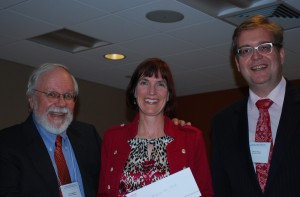 Congratulations to Eleanor ter Horst on her award-winning article, "Masks and Metamorphoses: The Transformation of Classical Tradition in Goethe’s Römische Elegien," German Quarterly 85.4 (2012): 401-19.Professor Horst (Clarion University) has written a learned and spirited essay which expertly draws links between Goethe’s Römische Elegien, and the French Renaissance poet Joachim de Bellay, Horace’s Odes, Ovid’s Erotic Arts, and Aeschylus’s Oresteia, among other Classical fore bearers. Professor Horst elucidates the dialogue between these many poets to contemplate the lifespan of erotic poetry when compared to the decayed monumentality of Roman antiquity. Without ever overtly referencing “dialectical logic,” the essay's argument shifts gently back and forth, balancing between Goethe’s sensitive appropriation of Latin poetry and his Modernist sense of distance from the ancient world.As Goethe scholars, we are always challenged by our more contemporary colleagues to explain what possible new topics one can find in the old man’s work. The answer lies not in extracting some sliver of a previously unnoticed insight, but to synthesize the already well-established and well-read commentary on Goethe, in order to combine it with new theoretical questions in a style that makes the eighteenth century come to life in our own present. Professor Horst has done just that.She traces the scholarly and poetic discussion of the elegy as a genre. Her argument follows Goethe's self-reflection on the division between the public and private. She is particularly attuned to the poem’s representation of intimacy in the media age of hyper sensationalism and the best seller. Professor Horst argues with speed and grace. Her learned article displays her thorough research into two centuries of commentary on the Römische Elegien without ever falling into a ponderous pace. Her style remains light and nimble, even at its most canonical moments of explication. She structures her argument along a rapidly shifting succession of oppositions, constantly substituting one familiar contrast for a surprising juxtaposition: north-south, ancient-modern, barbaric-civilized, always with an eye to the sexual resonance of each. In a surprising turn, Professor Horst explains the cross-gender, castrating connotations of the word “Gallier.” Even Luther’s Biblical German makes an unexpected appearance in her discussion of Goethe’s mythic sexual politics. The allusions in Professor Horst’s essay are so rich and so deftly intertwined, they leave the reader exhausted and in wonder at her writerly dexterity and editorial skill in composing such a finely crafted essay.
Congratulations to Eleanor ter Horst on her award-winning article, "Masks and Metamorphoses: The Transformation of Classical Tradition in Goethe’s Römische Elegien," German Quarterly 85.4 (2012): 401-19.Professor Horst (Clarion University) has written a learned and spirited essay which expertly draws links between Goethe’s Römische Elegien, and the French Renaissance poet Joachim de Bellay, Horace’s Odes, Ovid’s Erotic Arts, and Aeschylus’s Oresteia, among other Classical fore bearers. Professor Horst elucidates the dialogue between these many poets to contemplate the lifespan of erotic poetry when compared to the decayed monumentality of Roman antiquity. Without ever overtly referencing “dialectical logic,” the essay's argument shifts gently back and forth, balancing between Goethe’s sensitive appropriation of Latin poetry and his Modernist sense of distance from the ancient world.As Goethe scholars, we are always challenged by our more contemporary colleagues to explain what possible new topics one can find in the old man’s work. The answer lies not in extracting some sliver of a previously unnoticed insight, but to synthesize the already well-established and well-read commentary on Goethe, in order to combine it with new theoretical questions in a style that makes the eighteenth century come to life in our own present. Professor Horst has done just that.She traces the scholarly and poetic discussion of the elegy as a genre. Her argument follows Goethe's self-reflection on the division between the public and private. She is particularly attuned to the poem’s representation of intimacy in the media age of hyper sensationalism and the best seller. Professor Horst argues with speed and grace. Her learned article displays her thorough research into two centuries of commentary on the Römische Elegien without ever falling into a ponderous pace. Her style remains light and nimble, even at its most canonical moments of explication. She structures her argument along a rapidly shifting succession of oppositions, constantly substituting one familiar contrast for a surprising juxtaposition: north-south, ancient-modern, barbaric-civilized, always with an eye to the sexual resonance of each. In a surprising turn, Professor Horst explains the cross-gender, castrating connotations of the word “Gallier.” Even Luther’s Biblical German makes an unexpected appearance in her discussion of Goethe’s mythic sexual politics. The allusions in Professor Horst’s essay are so rich and so deftly intertwined, they leave the reader exhausted and in wonder at her writerly dexterity and editorial skill in composing such a finely crafted essay.